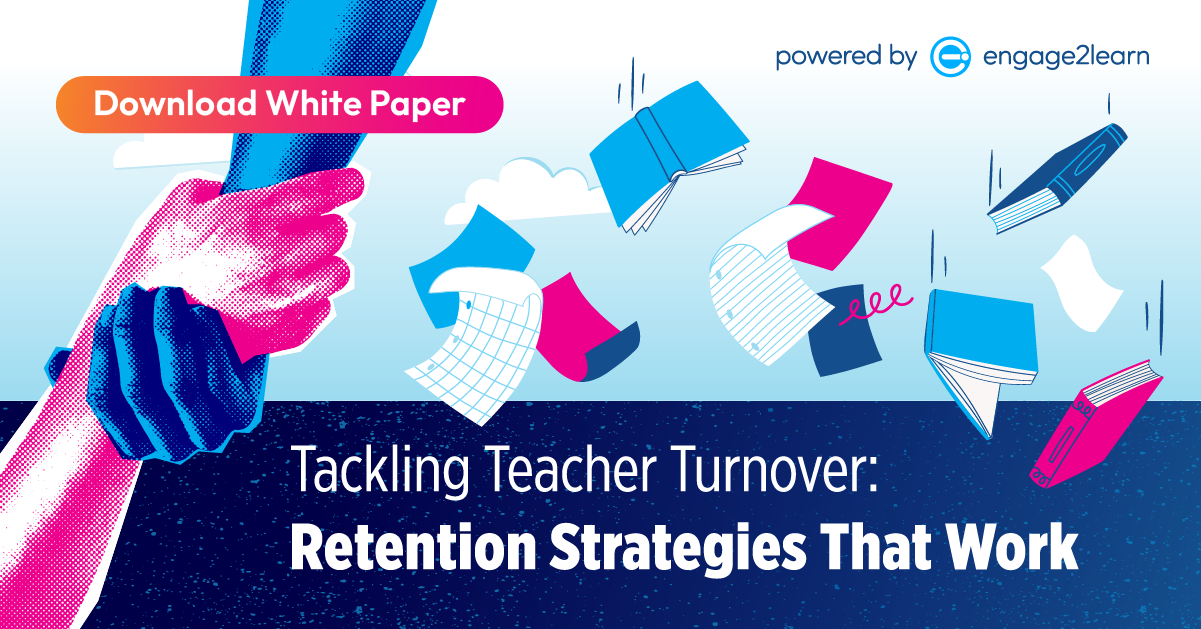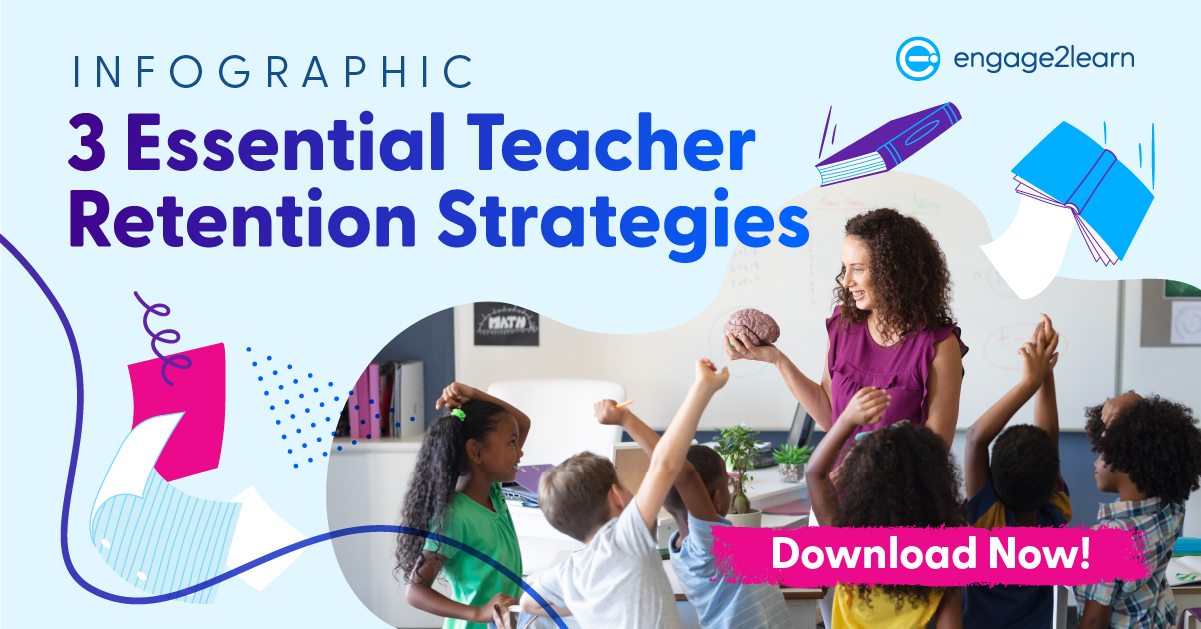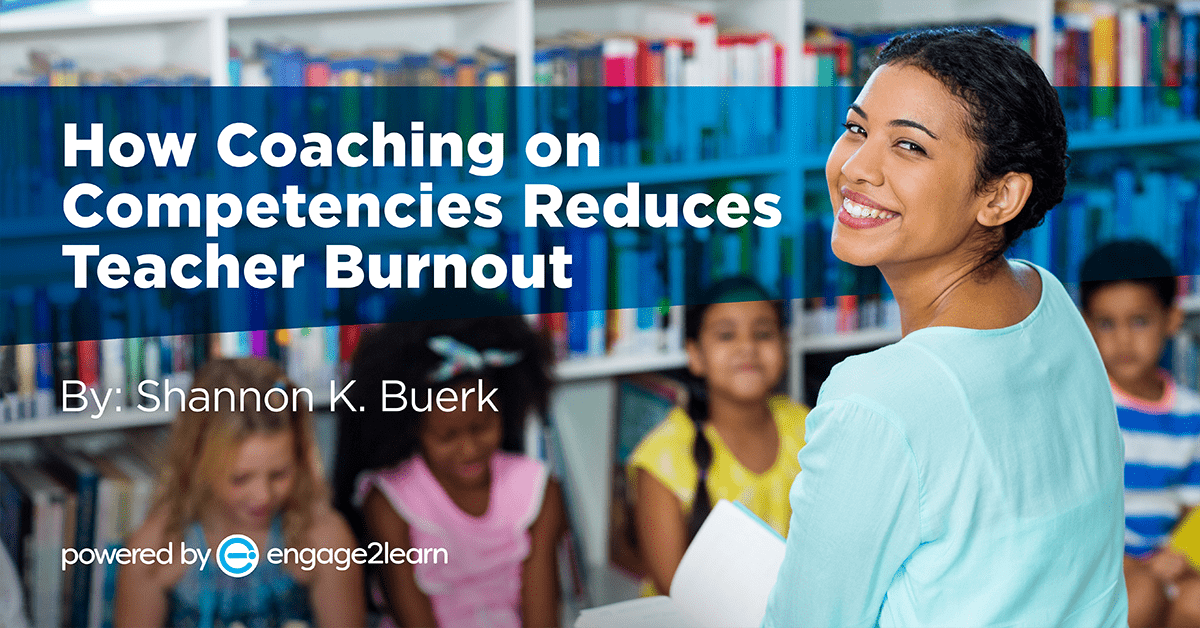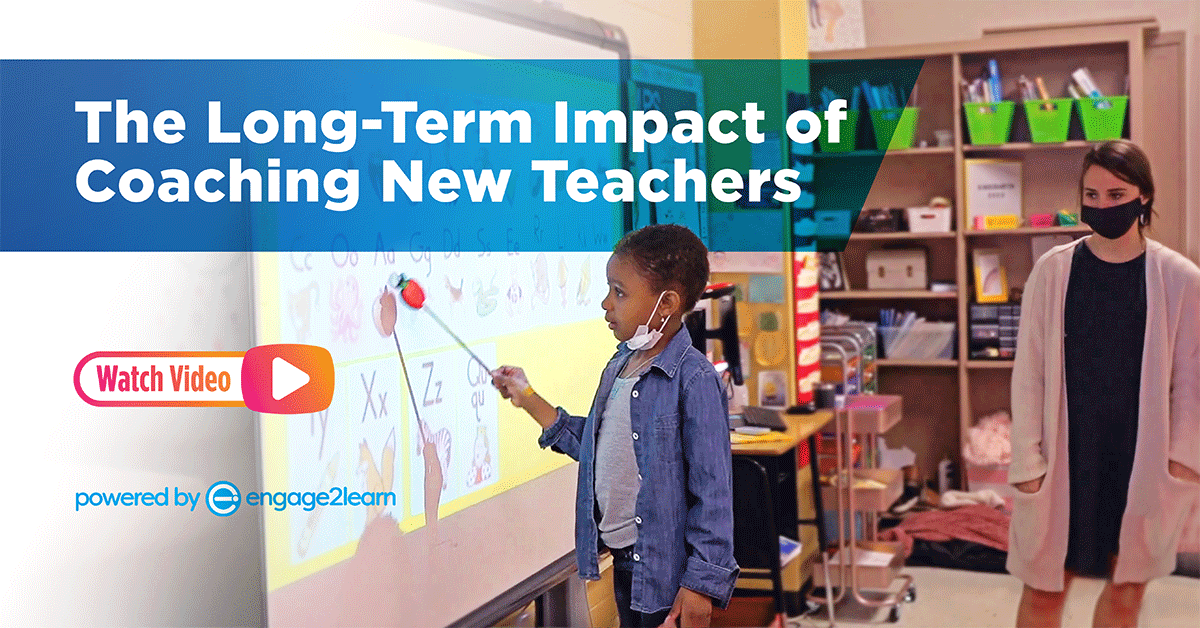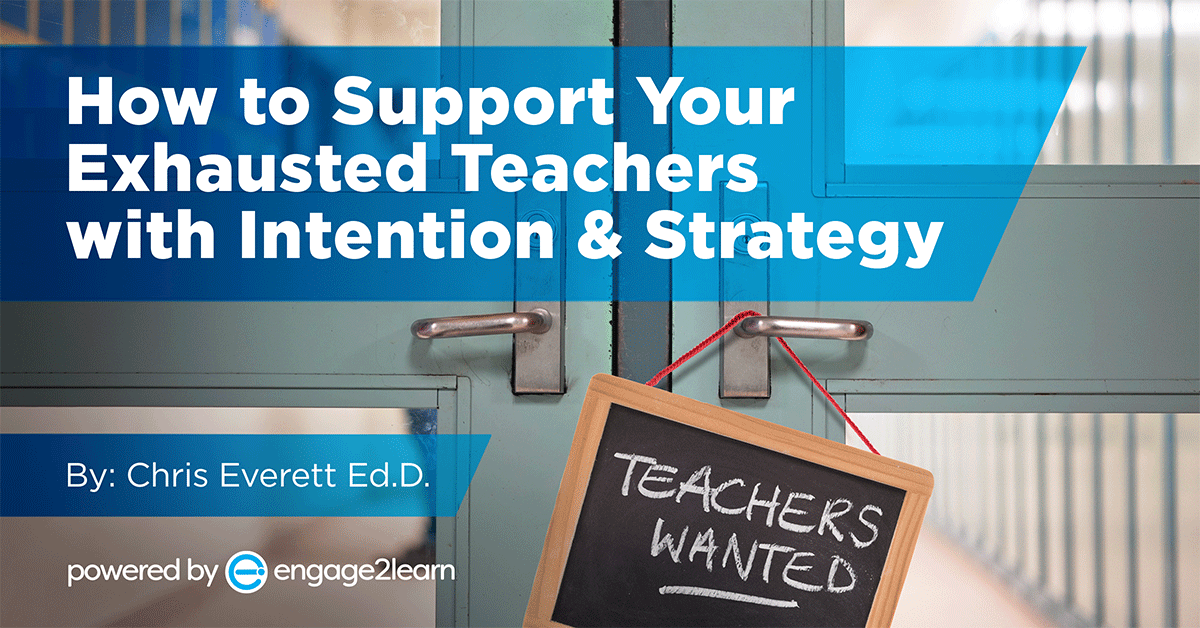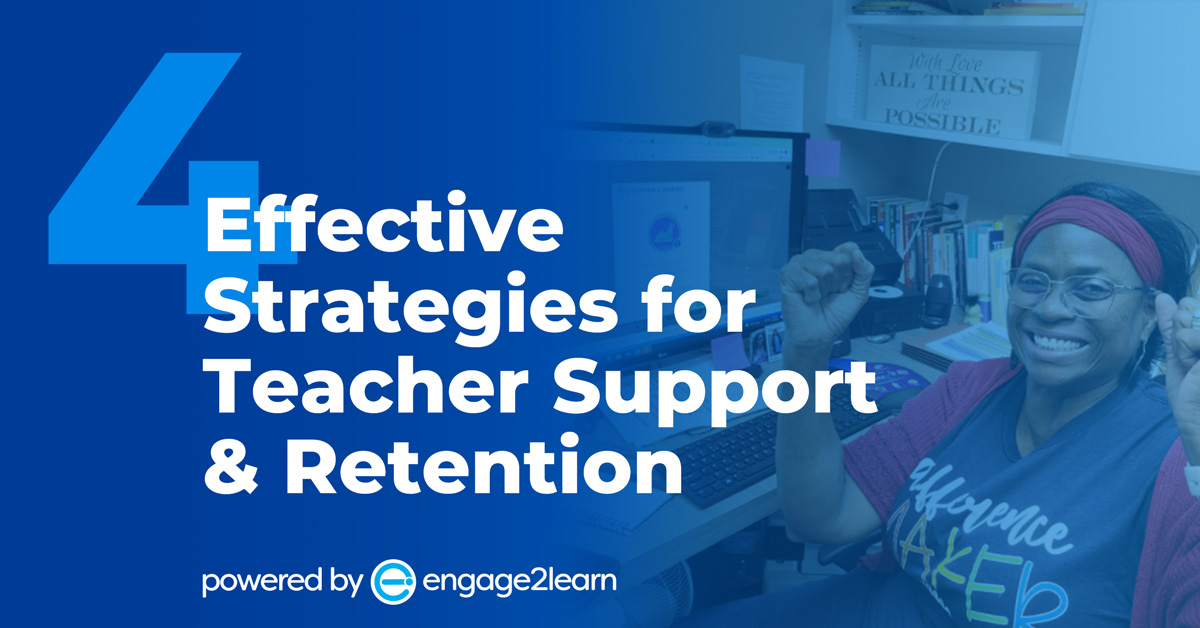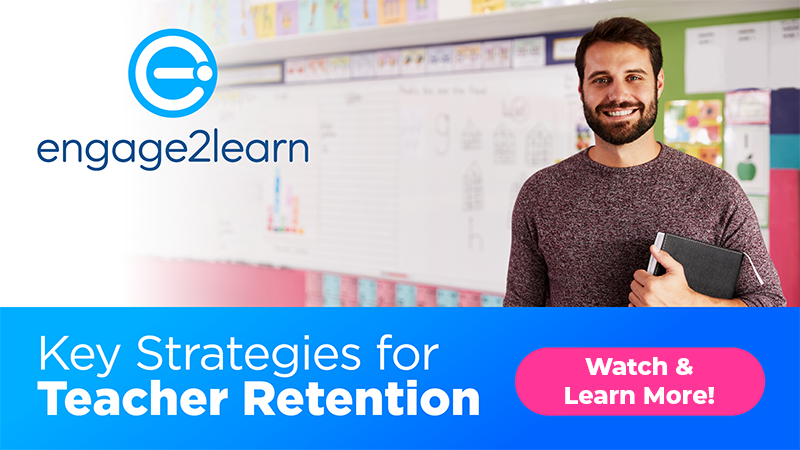Effective Strategies for Teacher Retention
Explore these resources to reduce teacher burnout, stress, & attrition and to help teachers feel more supported, confident, & happy in their work.

Teacher retention has been top of mind for school and district leaders for years...
...well before the challenge was exacerbated by the COVID-19 pandemic. Despite well-intentioned leaders, programs, and initiatives, many teachers continue to feel unsupported, overwhelmed, and burned out, with more deciding to leave either their current school or the profession entirely than ever before.
With each school and district faced with unique needs, it’s impossible to come up with a one-size-fits-all solution to high teacher turnover rates. The good news is that we know certain teacher retention strategies to be extremely effective when implemented thoughtfully and in collaboration with teachers themselves.
Join us as we dive into the world of teacher retention, explore the strategies proven to help schools retain teachers while creating a nurturing environment wherein educators and students alike can thrive, and unlock the secrets to sustaining these effective teacher retention strategies for the long haul.
Why is addressing teacher retention so important?
The impact of retaining more teachers cannot be overstated. In short, retaining teachers isn’t just about the simple act of keeping staff. It's about creating an environment that ensures teachers are excited to come to work, parents are eager to enroll their kids in the neighborhood public school, and students get the learning experiences that they deserve.
Here are just a few reasons why addressing teacher turnover matters:
Consistency and Stability:
Improved Student Outcomes:
Financial Cost:
Enhanced School Culture & Reputation:
Teacher Well-Being:
How much is teacher turnover costing my district?
While the exact financial cost of teacher turnover is difficult to determine, we do have enough information to make informed estimates. The Learning Policy Institute, for example, estimates the per-person cost of teacher turnover to be:
- $9,000 for rural districts
- $11,000 for suburban districts
- $21,000 for urban districts
Use our teacher turnover calculator to help gauge not only the financial impact of teacher attrition on your school or district, but also how much you could be saving by investing in teacher retention strategies that are proven to work. If you don’t know the exact per-person cost of turnover at your school or district, plug in one of the research-based estimates above.
Teacher Turnover Cost Calculator
How much is your school/district spending to replace teachers?
Number of Teachers
Total Replacement Cost
Be sure to figure in hiring, onboarding, and training costs for new teachers.
Current Attrition Rate
Conversely, if high teacher turnover creates a financial burden for schools and districts, high teacher retention creates financial security. For example, well before the COVID-19 pandemic exacerbated the challenge of teacher retention, the Arlington Independent School District (ISD) began providing comprehensive training and support to their staff through competency-based coaching for teachers, principals, and instructional coaches in partnership with e2L.
Despite pandemic-related disruptions in teaching and learning, coaching continued. As a result, while most districts began experiencing increased teacher turnover, Arlington ISD was able to retain 98% – 100% of their coached teachers over a five-year period.
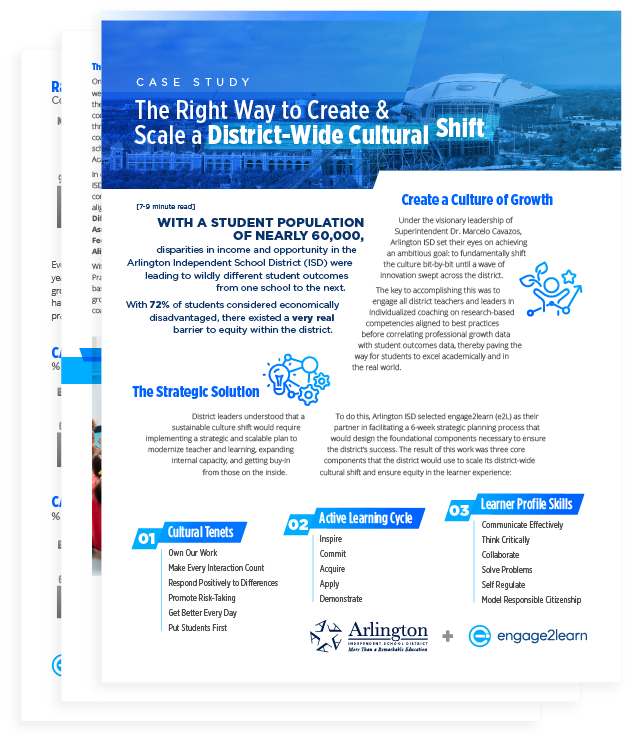
FEATURED CASE STUDY:
The Right Way to Create & Scale a District-Wide Cultural Shift
Arlington ISD in the Dallas-Fort Worth Metroplex leveraged job-embedded coaching to drive a district-wide culture shift and improved student outcomes. The effort also proved to be a major driver of teacher retention of coached teachers.
“Teachers who are thinking of leaving cite compensation, unreasonable expectations, and an inability to protect their well-being as their top motivators, while those who plan to stay cite meaningful work, quality colleagues, and compensation.”
“K-12 teachers are quitting. What would make them stay?”
McKinsey & Company, March 2023
ESSA Level 2 Efficacy Study:
Measuring the Impact of Coaching on Teacher Retention
In order to validate our own data, findings, and experiences in Arlington ISD, we turned to third-party evaluator Learning Experience Design (LXD) to analyze their teacher coaching and retention data during the 2017-2021 school years.
This well-designed, correlational study suggests that the implementation of e2L’s instructional coaching methodology meets the standard for ESSA Level 2 Moderate Evidence by having a statistically significant impact on teacher retention results. In short, LXD’s research shows that teachers who receive job-embedded coaching from e2L – and earn progress badges and microcredentials as evidence of growth in competencies – are significantly more likely to stay in their role than those that do not.
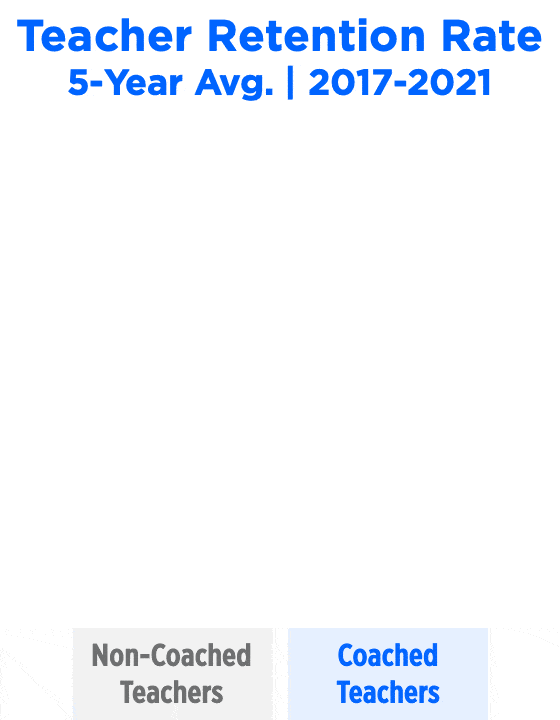
What can districts do to increase teacher retention?
According to a 2022 survey by the National Education Association, when it comes to teacher turnover and retention, here’s what we do know: more than half of teachers plan to leave the profession early, 90% of teachers say burnout is a serious problem, and resignations accounted for 51% of teacher vacancies.
Additionally, a 2023 study from the RAND Corporation found that nearly 90% of teachers report working at least 50 hours per week – working an average of 15 uncontracted hours weekly, 12 of which are reportedly unpaid.
Teacher retention continues to be a challenge, leading not only to high financial costs for districts, but also to strained systems, overwhelmed staff, decreased student achievement scores, and lower enrollment rates.
We recently asked leaders from several of our partner districts to share their experiences with and insights into why teachers are leaving the profession, what they’re doing to retain teachers, and how to sustainably nurture and retain top teaching talent.
In conjunction with our own data and independently validated research, we narrowed down the key takeaways and teacher retention strategies for you to consider implementing across your school or district.

FEATURED WHITE PAPER
Tackling Teacher Turnover: Retention Strategies That Work
Using independently validated research, in-depth discussions with district leaders, and our extensive experience working with hundreds of school districts nationwide, we have created this white paper featuring the top 5 teacher retention strategies employed by e2L and its partner district.
“We now have engage2learn coaches for every teacher and administrator in our district, and they’re adding some amazing tools to their toolbox. I’m already amazed by what they’ve been able to do.”
Cara Cooke, Former Superintendent, Aransas Pass Independent School District
Increasing Teacher Retention Through Talent Development
We know from experience (and data) that increasing teacher retention starts with building talent development and coaching systems that support, nurture, and elevate teachers. For over a decade, we’ve seen districts that have comprehensive instructional coaching integrated into their support systems consistently experience teacher growth in competencies, increased teacher retention rates, and improved student outcomes.
In short, in order to effectively combat teacher turnover, we need to treat teachers as talent.
5 Pillars of Talent Development
The talent development pillars are a culmination of 10+ years of working with public schools nationwide to create and sustain scalable systems that are proven to substantially increase teacher retention and job satisfaction while also improving outcomes for learners and overall school culture.
Click on a pillar to learn more
Culture & Strategy
Career Development
Coaching
Competency Pathways
Connected Data
Take the Talent Development Self-Assessment survey to identify which pillars your district is strong in and which pillars you can focus on next to increase teacher retention.
Featured Articles on Teacher Retention
Go Deeper:
On-Demand Teacher Retention Webinars
Tune in to any or all of engage2learn’s webinars on teacher retention, complete with expert panelists, diverse perspectives, invaluable insights, and actionable strategies.
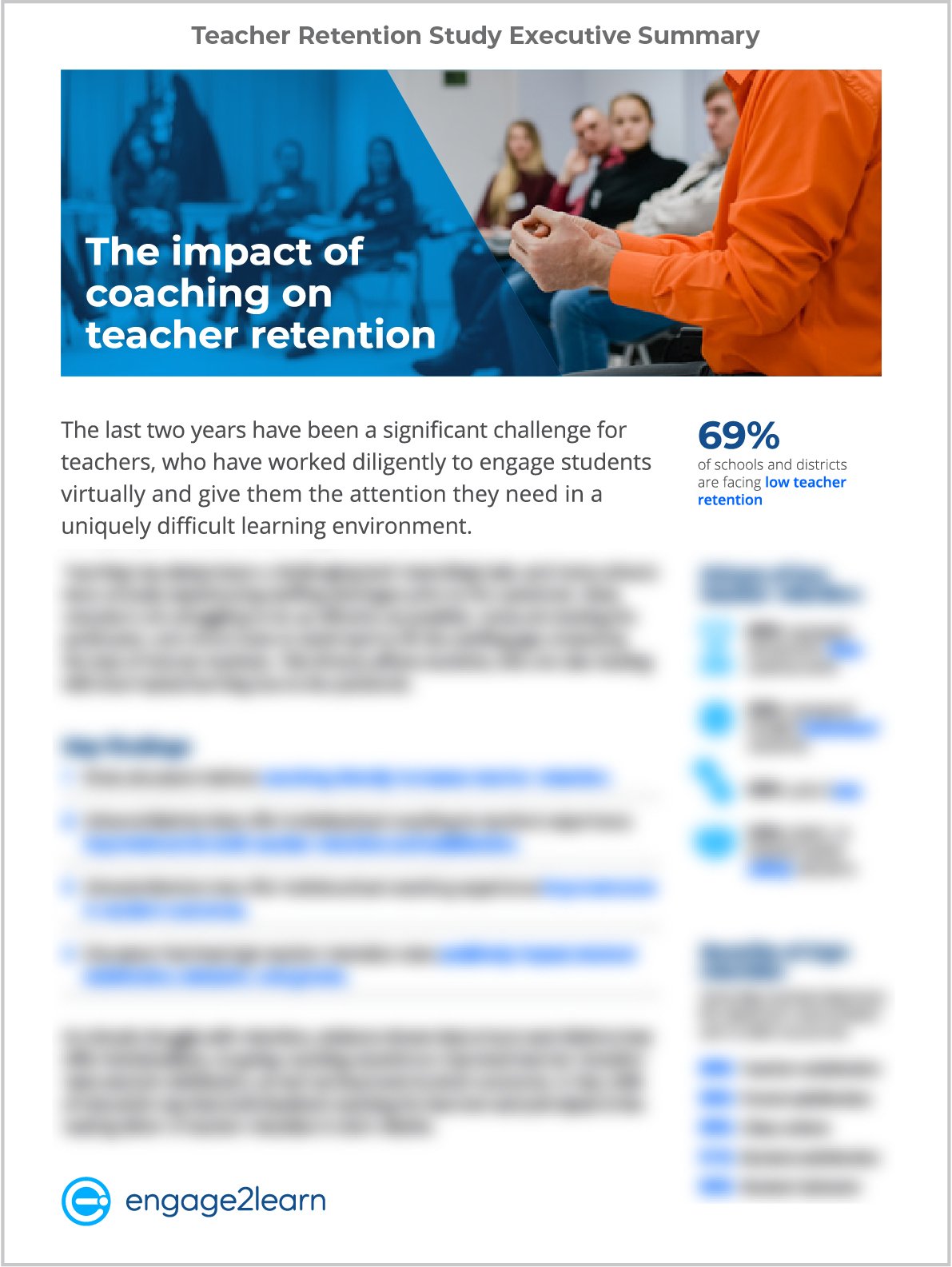
The Impact of Coaching on Teacher Retention: Survey
In July 2022, third-party researchers surveyed full-time school administrators employed at K-12 public school districts with more than 10,000 students on the best strategies for addressing teacher retention, finding that:
- 87% of schools/districts that offer individualized coaching report that it directly improves job satisfaction and teacher retention.
- Schools/districts that offer individualized coaching report improved student outcomes.
- Educators report that high teacher retention rates positively impact student engagement, behavior, and grades.
The survey results reveal that individualized, job-embedded instructional coaching is key to increasing teacher retention and accelerating student achievement.
Data-Informed Growth Coaching Workshop
Join engage2learn at an upcoming Data-Informed Growth (DIG) Coaching Workshop, a two-day, collaborative training built around the Science of Coaching that equips coaches and administrators with the skills and tools to implement a high-performance coaching program that is proven to decrease teacher burnout, increase teacher retention, and accelerate student achievement in tandem.


